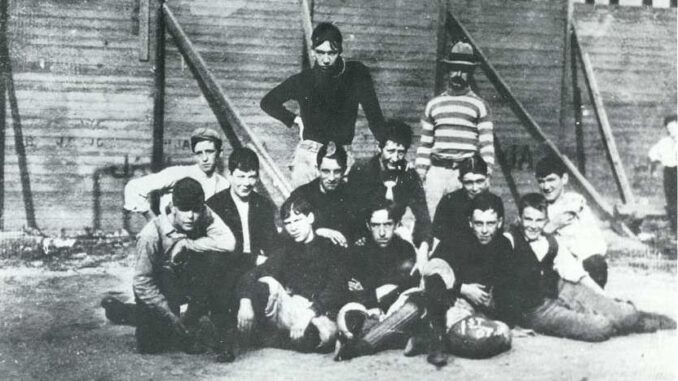
Over the next eight days we will be publishing the eight finalists from the 2020 Voorheesville Short Story Contest. This, the last of our three finalist stories, made it to the final round of judging. Today, enjoy Megan Romansky’s story, “When the Stands Become the Slums.”

My heart continued to pound. I was exhausted, sweat dripping down my face. In the distance, I heard chants, but they were muffled. In my peripheral vision, a tall boy began to walk into the batter’s box. I spun the baseball, feeling its threads drag across the palm of my hand.
“One more strike,” I muttered to myself. “That’s all we need.”
The umpire signaled. I was ready to pitch. I winded up and placed the ball behind my glove. Staring down the plate I let out a sharp breath and threw. The ball quickly released out of my fingertips, beginning its path of flight.
With a thwack, the ball made contact with my catcher’s glove, settling with a small cloud of dust. For a moment the whole field was silent, holding its breath in anticipation.
In a roaring voice, the umpire pierced the silence. “Strike three, you’re out!”
A sudden burst of excitement filled the air. My teammates ran at me, jumping for joy. Even Coach began to celebrate. I smiled and cheered along with my team
That day was one of the most exciting times I had had in my life. But what I didn’t realize was that it was going to be the last time I could ever play the game that I loved.
Following the game, I made my way back to my house. My family had lived in a brick cladded home in Greenwich Village. I loved it there, it was always bustling with cars and people. There were large murals and music and laughter could always be heard.
Life had been simple up until then, for generations my family ran a dressmaking business, sewing and tailoring dresses for women of all classes. Every day, my father and mother would work there along with my eldest brother, Albert, who would eventually take over the company. My older sister, Emma, and I would go to school on weekdays. I hated school and the thought of sitting down and being taught always bored me. Emma was the smart one, she had perfect grades and dreamed of going to college. College never really was a thought for me, the only thing I loved to do was play baseball. Excitement and adrenaline would fill my body; playing baseball with my friends was the one thing that always made me happy.
I reached the stairs leading up to our house. For those times, it was a home many aspired to one day have. It was large, with tightly packed bricks in perfect order. We lived close to Washington Park, and if you walked down the street you could see the arch. It was, to put it simply, amazing. I would walk home from school through the park so I could walk underneath it. There were so many things around my house that were great. But, I didn’t realize how much I should have appreciated it at the time.
I walked up the several steps to the front door. The sturdy door swung open with a push and I stepped inside and looked into the house. In front of me stood our living room, which was connected to our kitchen. The normally cheerful home seemed grave. I turned to look at my parents standing together. My mother’s face was pale as if she had seen the Devil. Closing the door alerted my parents of my presence, and with a jump, they turned toward me.
My father began to talk, “William”. I knew this wasn’t going to be good. My parents only called me by Will unless something bad happened. He continued, walking over to me, “there’s no simple way to put this. Come sit down. Your mother and I have, well, not the greatest news.”
He led me over to the living room. In the room, the vibrant plants seemed dull. My mother loved her plants and flowers, while my father hated them. He called them a “waste of space and money”. Whenever he tried to get rid of them she would throw a fit.
“They make it bohemian!” She would declare, her girlfriends said it was the new style here.
Numbly the two of us sat around the fireplace while my mother hugged the framework on the entrance to the room. “Son, our business hasn’t been doing great. We haven’t made good profits for months. With all the new factories, we just can’t compete with those prices. They have a whole damn monopoly going on”. With a sigh, he put his head in his hands. “We’re in debt William, we ran out of money. We practically have to liquidate everything, our company, our home. . . everything. I’m sorry we didn’t tell you earlier; your siblings knew, but we wanted you to have fun at school and not worry.”
I was angry, my head spinning. What were they thinking? How were we supposed to live? Where would we go?
“We have already made arrangements to move down to an apartment by the East River. Your mother and I will find jobs.”
“So we’re going to live in the slums you’re saying? We’re putting ourselves at the same level as all the immigrants?”
“William,” my mother interrupted. “This will only be temporary, we will work hard to get extra money, the rent is cheap so we can save up. We also thought you and your siblings could help.”
The last part she said was faint, but I knew what she was saying. “So Emma and I have to give up school?” I questioned. “What about baseball? If we have to get jobs will I be able to play?” The silence in the room confirmed my answer.
My father stepped in, “We know you don’t like school, you have no future with education. You’re going to have to get a job in the future anyway, you might as well start early.”
His words were harsh but true. I wouldn’t get the business anyway, I would have to make my fortune on my own way anyway. Disheartedly, I stood up. “When do we leave?”
“A few days, enough time to get things situated with school and the home,” my mother responded.
“Alright,” I said. I walked out of the house, I didn’t know where I was going, but I needed to leave. Slamming the front door, I ran down the steps out onto the busy street. Tears began to fall, and I wiped them with the sleeve of my shirt. I wasn’t supposed to cry, boys don’t cry. I couldn’t really process what was happening around me. Everything I loved, this whole place, baseball, were all going to be ripped away from me. Mother said it was temporary, but what if it wasn’t like that. I started to walk down the street to the bakery. The normally enticing smells of baked goods smelled putrid. I felt sick to the core. I hadn’t seen it but my friends on my team talked about these places. There was garbage on the streets, and homeless people ravaging for anything to help them. We had so much, and for it to be thrown away in less than a few days was unfathomable. I looked at the arch across the street.
“It is a sign of the American dream,” people would always say. It was bull, my life was being broken down. Right in front of me.
~
Days passed, and it was finally time to move. We only had the bare minimum, a few pieces of clothing, food and cooking supplies, and our sentimental items. My parents gave me the family Bible to hold as we made our way down to our new place. I clutched the worn leather and traced my fingers along the gold leafing and prayed. “God please help us with whatever we need to get through. I don’t think I’ll ever be able to live like this. Everything we have is gone. Please God, I will do anything to go back to the way things were.”
We reached the area of our flat, and I was at a loss for words. What everyone had said was far from worse. It was cramped as if the buildings were built on top of each other. The roads were broken, filled with potholes and cracks. It smelled as if something was dead, and it probably was. There was so much garbage that you couldn’t tell what everything was. I looked around and noticed the rusting street sign. It faintly read ‘Madison Street’. How ironic, a president like him wouldn’t want people to live like this.
My parents, Albert, Emma, and I stood in front of where we would live and placed down our belongings. “The owner should be here soon,” my father declared.
Sure enough, a rumbling noise came from down the street. Swerving between the people and garbage, a black shiny Audi drove. It came to a halt in front of the building and parked. A large, tall man came out of the passenger side of the vehicle. In ornate clothing, he waddled over and shook my Father’s hand.
“You must be the Rhode Family, eh?” he asked with a gruff voice.
“Yes Sir, and you are-”
“Mr. Mayer exactly. So, you will be on the third floor with the Hopkins. They’re a very nice family, they pay their rent every time,” he scoffed. “Now you’ve paid your first down payment. But rent will be due in two weeks’ time, costing eight dollars.”
“Excuse me, Mr. Mayer,” my Mother interrupted. “We are sharing? I thought you said we would have our own apartment to ourselves.”
“Well yes,” he responded. “You have your own room to sleep in. But everything else is shared by the apartment or floor. How else do you think you got the discount?”
We were silent, simply ashamed of what everything had come down to. Mr. Mayer continued. “Now I’ll let you all see yourself in. I shall be back soon to collect rent. Have a good day!” He turned around and made his way back to the car. I clenched the book hard, how could this man do this to someone? All that wealth and he was allowing us to live like this? I hoped that I wouldn’t be like him when I was older.
As we watched him drive off, my Mother fell to her knees and sobbed. “Oh lord, why us? What did we do to deserve this?”
Albert kneeled to comfort her. He was clearly distressed but held his composure. “It’ll be alright,” he consoled. But in reality, none of us knew if it would. Everything in our life was turned around.
I sighed, how I wished I could be playing baseball right now. Even school sounded better. Although our school was downright awful, it was better than living in this trash.
My father helped my mother up, and we all stood ready to enter. Once we stepped into this place, our lives would be practically miserable and completely different. Fearful of what was to come, we walked into our impending fate.
